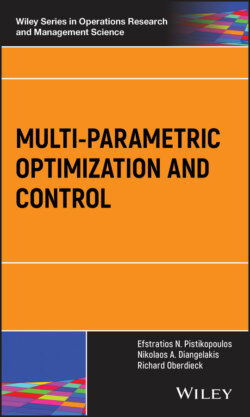Читать книгу Multi-parametric Optimization and Control - Efstratios N. Pistikopoulos - Страница 12
Preface
ОглавлениеMany optimization problems involve parameters that are unknown, either because they cannot be measured, or because they represent information about the future (e.g. future state of a system, future disturbance, future demand). Multi‐parametric programming is a technique for the solution of such class of uncertain optimization problems. Through multi‐parametric programming, one can obtain the optimization variables of the problem as a function of the bounded uncertain parameters, and the regions (in the space of the parameters) where these functions are valid.
Theoretic and algorithmic developments on multi‐parametric programming, along with applications in the area of process systems engineering, have been constantly emerging during the last 30 years.
A variety of algorithms for the solution of a range of classes of multi‐parametric programming problems have been developed, with our group publishing over 80 manuscripts, 21 books and book chapters, and 2 patents on the subject. We have further developed a MATLAB© based toolbox, POP©, for the solution of various classes of multi‐parametric programming and a framework, PAROC©, for the development of explicit model predictive controllers.
This book aims to enable fundamental understanding in the areas of multi‐parametric optimization and control. We hope that by the end of the book, the reader will be able to not only understand almost all aspects of multi‐parametric programming, but also judge the key characteristics and particulars of the various techniques developed for different mathematical programming problems, use the tools to solve parametric problems, and finally, develop explicit model predictive controllers.
The book begins with an introduction to the fundamentals of optimization and the basic theories and definitions used in multi‐parametric optimization. Then, two main parts follow, providing a clear distinction between algorithmic developments and their applications in the development of explicit model predictive controllers.
Part I focuses on the algorithmic developments of multi‐parametric programming. It begins with an overview of the basic sensitivity theorem and progresses to describe solution strategies for linear, quadratic, and mixed‐integer multi‐parametric problems. A chapter for the solution of the aforementioned classes of problems in MATLAB© is also included. Part I concludes with developments of multi‐parametric programming for the solution of other classes of problems.
Part II focuses on multi‐parametric model predictive control and its extension for the solution of other control problems. This section concludes with the presentation and applications of PAROC© framework, a framework for the development and closed loop validation of multi‐parametric model predictive controllers.
As this book is the outcome of the research work carried out over the last 30 years at the Centre for Process Systems Engineering of Imperial College London and the Texas A&M Energy Institute of Texas A&M University, many colleagues, former and current PhD students, and post‐doctorate/research associates have been involved in the presented work. While a number of them are involved in this project as co‐authors, we would like to take the opportunity to thank in particular our current research team at Texas A&M Energy Institute, particularly Dr. Styliani Avraamidou and Mr. Iosif Pappas.
We would also like to gratefully acknowledge the financial support kindly provided by our many sponsors, EPSRC, NSF, EU/ERC, DOE/CESMII, DOE/RAPID, Shell, Air Products, Eli‐Lilly, and BP.
Finally, we would like to thank Wiley‐VCH for their enthusiastic support of this effort.
Richard Oberdieck
College Station, October 2019
Efstratios N. Pistikopoulos
Nikolaos A. Diangelakis
